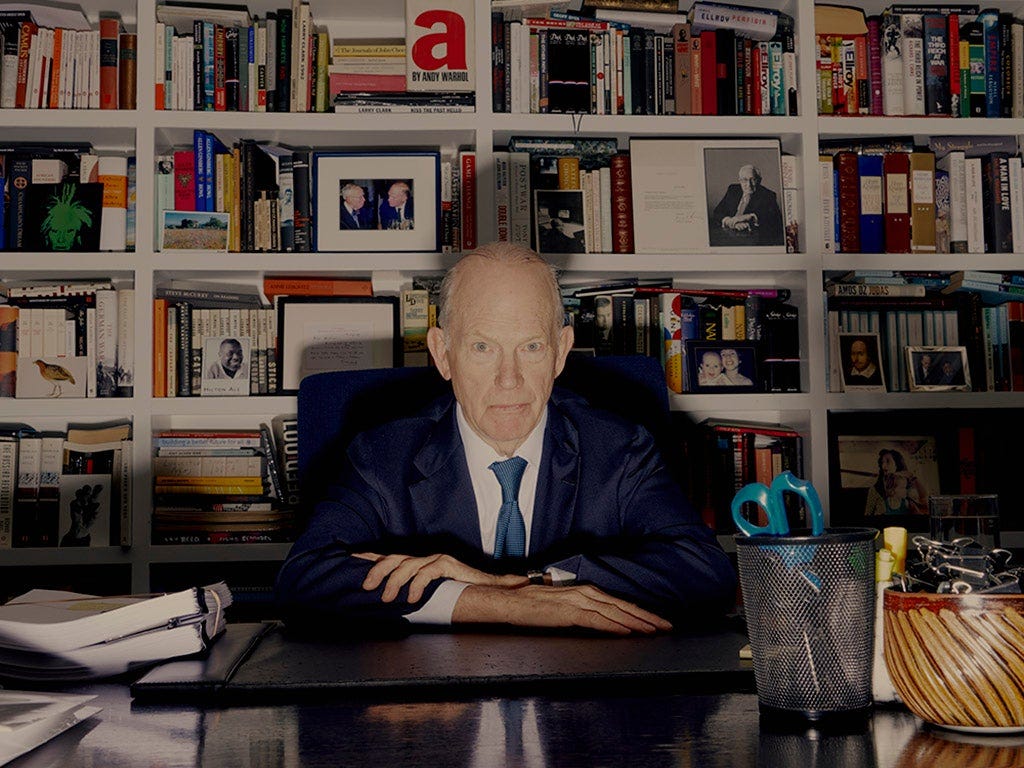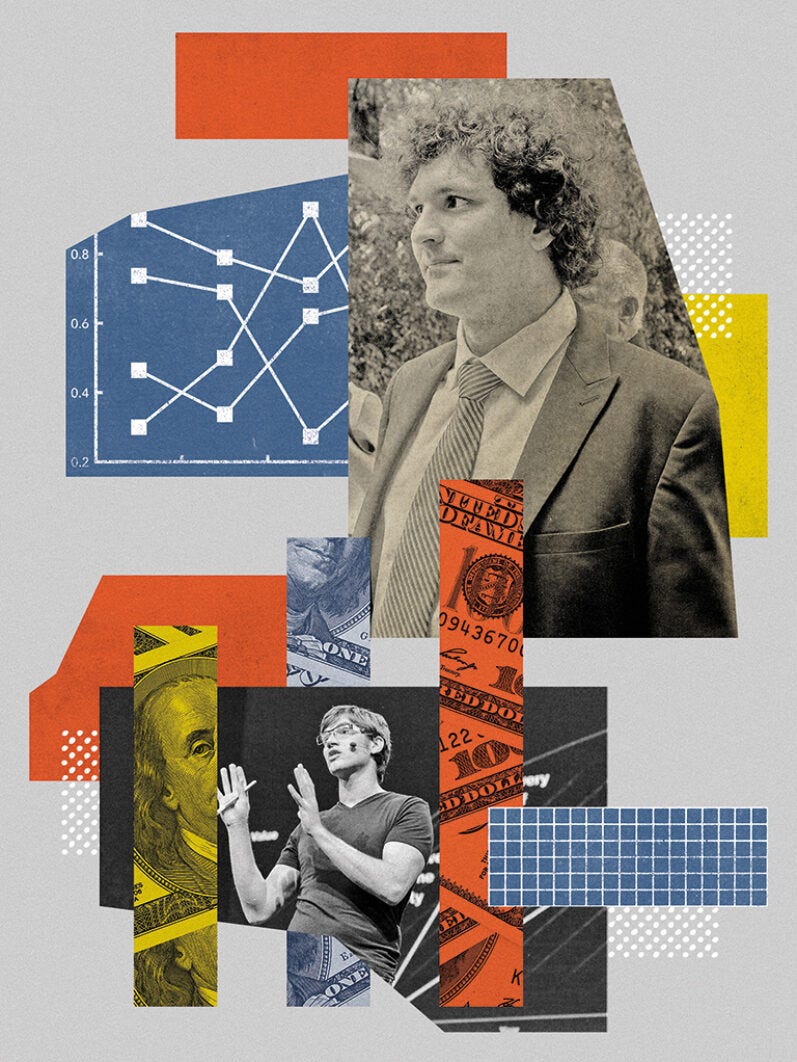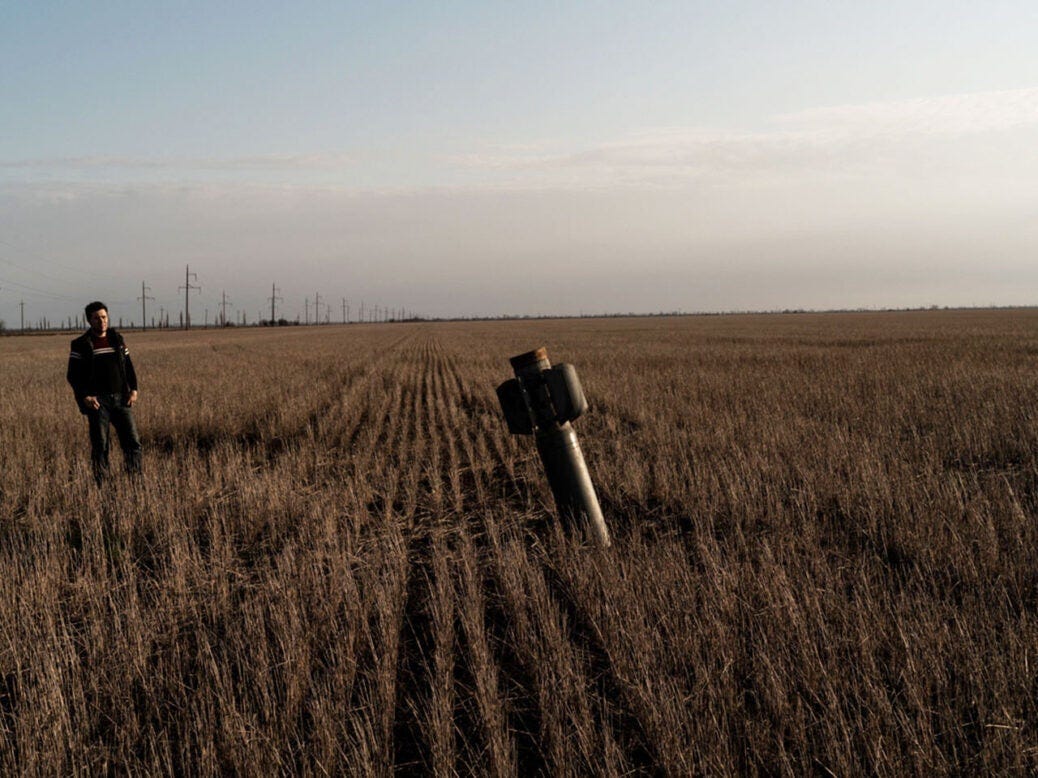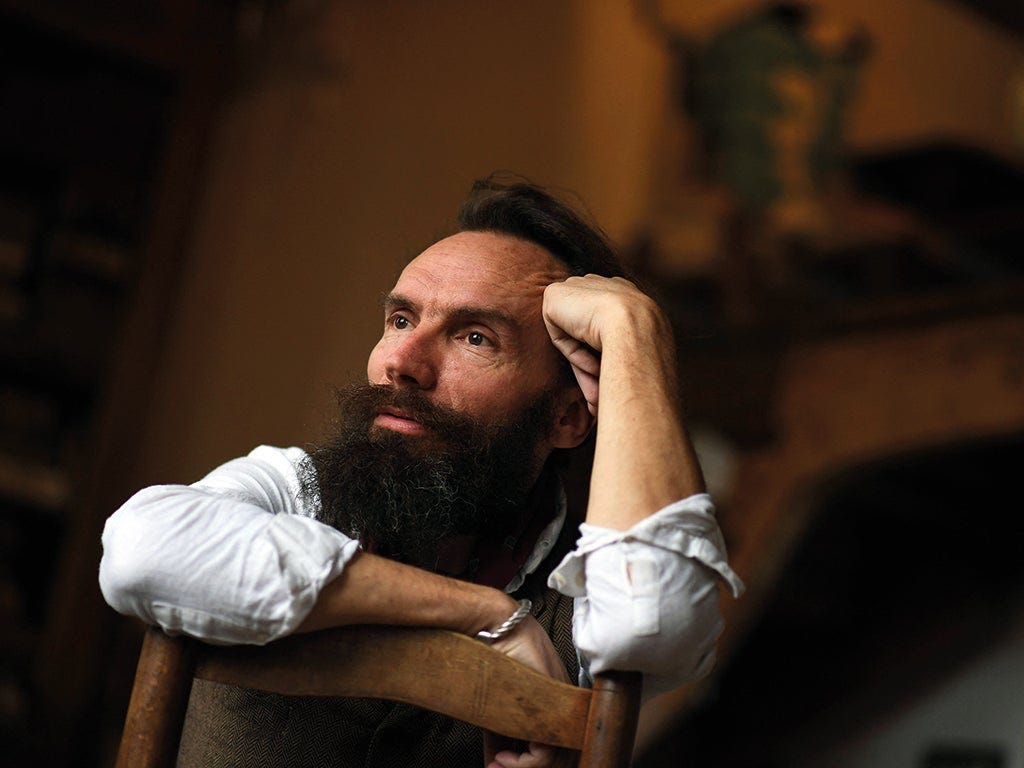The Saturday Read: World at war
Inside: Israel-Hamas, Labour, SBF, Beckham, Netflix, Poland, and the divine rat race.
Good morning, and welcome to the Saturday Read, the New Statesman’s weekly guide to the best writing on ideas, politics, books and culture. This is Harry, along with Pippa.
Six minutes after we sent you the SR last week, Israeli prime minister Benjamin Netanyahu declared that Israel was at war. We have a raft of pieces for you on the conflict today.
Labour, meanwhile, held its party conference. Keir Starmer’s long apprenticeship as leader of the opposition – reminiscent of Blair in the 1990s and Cameron in the 2000s if he wins, or Miliband in the 2010s if he loses – is a reminder that the four most recent prime ministers (May, Johnson, Truss and Sunak) were all put into office by the Tory party, rather than elected. May and Johnson went on to win elections; barely in May’s case, strongly in Johnson’s, both against Corbyn. But none of the four spent any time in opposition, having their plans for government scrutinised. It showed.
If today’s pieces intrigue, perhaps you’d like to try a trial subscription to the NS. Read three free articles after registering on our site. A digital subscription is only 95p a week. Let’s get to it.
The future of training is happening today, in the metaverse.
1—“It is as if they believe the religious fanaticism they condemn in Iran transmogrifies into something authentic and benign once it reaches the borders of Gaza.”
Munira Mirza, who ran the Downing Street policy unit from 2019 to 2022, started researching radical Islamism 20 years ago. She casts this week’s events in their context in this essential column. HL
At the heart of this violence are men who peddle Islamism: a warped, politicised version of Islam – one of the world’s great Abrahamic religions, practised peacefully by hundreds of millions – to exert control over their citizens and extend their influence across the region. As the Iranian human rights activist Maryam Aslany wrote in this magazine a few weeks ago, Western commentators need to see that the theocratic regime of the ayatollahs is not an authentic representation of the people but a colonising force that has engineered a hostile takeover of a great country, the cradle of one of the most significant civilisations in history.
2—“For years… Netanyahu was able to ignore the Palestinians while claiming one diplomatic victory after another.”
Fifty years ago this month, Israel was caught off guard by another attack, on that occasion led by Egypt and Syria. Israel forgot the lessons of the Yom Kippur War, writes Robert D Kaplan. PB
Between 1967 and 1973, Israeli strategy was lulled into a triumphant mindset, following its territorial conquests in the Six Day War. Israel’s prime minister, Golda Meir, did not act on signals coming from Egypt regarding possible peace talks with its president, Anwar el-Sadat. She and her cabinet, following the Arab military debacle of 1967, simply did not consider that the Arabs were strong enough to go to war again. They lacked anxious foresight and constructive pessimism. Tragedy came in October 1973 when Egypt, in coordination with Syria, launched a surprise attack on Israel across the Suez Canal and, in the north, into the Golan Heights.
3—“There are 1,500 writers behind me. So I can do anything I want.”
I interviewed Andrew Wylie, the famed agent who presides over literary New York from a skyscraper two blocks from Central Park. Wylie is so quotable I would quite like to print some of his lines on a mug. The New York Times’ book critic described him to me as the “last interesting human in publishing”. See what you think. HL
Don’t call him the Jackal. “The Jackal thing doesn’t interest me,” he had told another interviewer, and I didn’t want to bore him. Andrew Wylie, 75, is the agent around whom the New York literary world has had to orient itself for four decades now. His pugnacious reputation as the man who holds publishers to ransom and snatches prized authors from other agents precedes him. Talk to him and you will soon realise he values two qualities in people: how much they have read, and whether they are amusing.
4—“Labour has tended to clothe radical policies in conservative language.”
If you did not follow the Labour conference closely, here is a set of pieces that capture its mood and energy: Anoosh wrote on Rayner and Reeves, while Andrew and Freddie examined Keir Starmer. George was also there – he sees a quiet radicalism in Labour’s evolving policy agenda. HL
Governments are ultimately shaped by the world in which they find themselves. Who imagined that Brown would nationalise the commanding heights of the banking sector or that Sunak would pay the wages of nine million furloughed workers? In an age of permanent crisis, a Labour government will probably have to be more rather than less interventionist than expected. But this week has shown that the party’s starting point is already more social democratic than appreciated.
Sign up to our weekday political email here:
Virtual welding lets me train as much as I want, increasing my skills and access to opportunity.
5—“The boy king of billionaire bullshit.”
Michael Lewis’s portrait of Sam Bankman-Fried, Going Infinite, has been published to coincide with the crypto tycoon’s trial for fraud. But SBF is an unworthy hero for Lewis, writes Ed Smith – he isn’t interesting enough. Lewis’s take on SBF is also misjudged at its core, as the trial is exposing day by day. PB
As SBF “develops” among Silicon Valley’s princelings, any question that does not yield a verifiable and quantifiable answer is deemed stupid – especially literary criticism, English, the arts full stop. If it’s not maths, it’s not real. Society and its expectations about behaviour are lumped together with literature and Santa Claus. Humanities are dumb because you can’t have a “proof”. Art itself? Blank. Religion? Duh. Listening to other people? Yawn. Sleep? Whatever dude. An ironed shirt? Lol! SBF had been told he was “different” and “interesting” for so long that he swallowed the “contrarian” Silicon Valley values that surrounded him.
6—“‘Brand Beckham’ must never die, and to survive it has to keep moving.”
Clive Martin has been writing some fantastic (demotic, elegiac) pieces for us recently. Here is his latest, on the closest thing Britain still has to a national hero: David Beckham, now the subject of that form of our age – the Netflix documentary. HL
Thankfully, the kids, or their own career-pushing significant others, don’t appear until the very end – in a short, touching get together at David’s elaborate BBQ zone in their Cotswolds pad. Yet in this moment you can see the all-encompassing thirst for survival at the heart of Brand Beckham. That desire they have to pass down the torch, even in the face of total public antipathy.
But really, this is a show about football, and perhaps about unfulfilled potential. The overwhelming impression I came out with at the end is that Beckham was an athlete who let his celebrity consume everything. He spent much of his later career in exile, on the bench, clogging along at glamour clubs, when really, he should have been a Premier League legend.
7—“Netflix… enjoyed an adolescent growth spurt that roughly lasted from 2010 to 2020.”
Peter Biskind, the chronicler of Hollywood in all its forms (try this), writes for the NS. His subject: how streaming ate itself. HL
If current trends continue, Netflix, Apple Plus, Amazon Prime Video, Disney Plus and perhaps Max, will flourish, effectively monopolising – and limiting – our viewing choices in the same way that ABC, NBC, CBS and Fox did in the network era. That is, delivering anodyne programming designed to offend no one while reaching the largest possible audience. As the show-runner Matthew Weiner said, according to an executive I spoke to, “It’s like Mad Men never happened. All the stuff we did, never happened. We’re right back to where we were. Except there’s more of it.”
8—“Fissures in Poland’s relationship with Ukraine had been forming for a long time.”
Relations between Poland and Ukraine, exceptionally good through much of the Ukraine war, are now steeply declining. Ahead of parliamentary elections in Poland tomorrow, Lily Lynch last week pinpointed the cause: grain. (For more on tomorrow’s election, Jeremy Cliffe has written on Germany and Poland.) PB
The clash first became apparent when, at the UN on 19 September, Zelensky accused some unnamed EU members of “feigning solidarity while indirectly supporting Russia”. The following day, Warsaw summoned Ukraine’s ambassador to Poland over the remarks. Within a few hours Mateusz Morawiecki, the Polish prime minister, had stunned the world by announcing that his country would no longer be arming Ukraine. Polish arms, he intimated, were now needed for Poland’s own defence. Meanwhile, Andrzej Duda gave an eviscerating statement at the UN in which he likened Ukraine to “a drowning person clinging to anything available”.
9—“Why did it take hours for Israeli security forces to reach communities under attack?”
In a must-read outline of how we got to this point in the Middle East, Alona Ferber investigates Netanyahu’s failure to prepare, and argues we should abhor violence by all. (Alona has also interviewed the daughter of two hostages taken by Hamas.) PB
A coterie of Western leftists have lauded the attack (which also targeted foreign nationals and Israeli Bedouin) as legitimate resistance to occupation; the war crimes of hostage-taking and the murder of civilians a victory, somehow, for self-determination. It should be possible to say two things at once, however: that Israel’s violence against Palestinians is unconscionable and so is the slaughter of Israeli citizens.
Best of the Rest
Will’s away this week, so here is a war rations Best of the Rest.
FT: Gaza on the brink.
Economist: Hamas has failed to rally the Middle East.
Reload: Israel loosens gun laws.
New York Times: House Republicans can’t pick a speaker. It’s not like America needs a speaker to pass laws or anything.
Anne Applebaum: In the New World Order there are no rules.
Christian Lorentzen: My generation. The sort of piece I can’t resist.
Matthew Schmitz: Millennial socialists embrace atrocities.
Sanna Marin’s new party. Sign me up.
Elsewhere on the NS
Will sat down with Edward Luttwak (well, virtually). Click through for a fascinating 2,000 words on the backdrop to the Hamas attack, featuring this provocative aside on Israel’s recent judicial protests: “We arrived, then, at a new definition of democracy: democracy is what the liberal establishment says it is. There is a culture of contempt for the common man.”
Talking of national treasures, Fred Skulthorp wrote this excellent piece on their diminishment last week. Check it out – we should have sent it to you then: “Fry seemed changed from his days of Twitter whimsy. A Sunday morning appearance on the BBC conjured up the repressed spirit of a bitter estranged uncle in a rosé-driven red mist.”
Lina Khatib, director at the Soas Middle East Institute, writes on how Israel is paying the price for the West’s failure to face Iran.
Pippa Bailey met the French paleoanthropologist Ludovic Slimak to discuss what he is uncovering about Neanderthals, an “utterly different humanity”.
As Silicon Valley cashes in on the crisis in mental health care, Jenny Kleeman asks whether AI will ever master the mysteries of human consciousness.
In case you missed it, Katie Stallard wrote a fine counterblast to our recent John Mearsheimer interview: “When the facts change, the Nobel Prize-winning economist Paul Samuelson once said, I change my mind. Not so the realist scholar John Mearsheimer.”
How long can Humza Yousaf last? Chris Deerin, our Scotland editor, sits down with Scotland’s first minister.
Americans don’t belong in Europe, proposes Justin Smith-Ruiu.
Rachel Cooke finds the BBC’s Jimmy Savile drama The Reckoning entirely, queasily gratuitous.
What we’re watching: Sound of Metal (2019)
Wow, what a film. I started idly watching it one night this week. I could scarcely look away. Sound of Metal manages to be both harrowing and captivating. Is that the mark of great art? The storyline, carried by an exceptional Riz Ahmed, is too compelling to ignore: he plays a heavy metal drummer who begins to lose his hearing. Let it run from there. Delight in the film-making: the shots, the sound, the editing. HL
Thank you for reading. Don’t miss out – subscribe to the New Statesman and stay up to date with everything you need: from news and analysis to comment and criticism.
Whether you’re looking for a sharp blog or a finely written feature, the New Statesman has you covered. Have a good week, and catch you next Saturday.
Thanks to Chris Bourn.























What this world may collectively need to brutally endure in order to survive the long-term from ourselves is a critical common cause. But what could that be other than a shared global-scale threat?
Humanity would need to unite and defend against it — it being an even greater nemesis than our own formidably divisive politics and perceptions of differences, especially those involving race.
During this much-needed human allegiance, we’d be forced to work closely side-by-side together and witness just how humanly similar we are to each other in every significant way.
... Until maybe some five or more decades later, when all traces of the nightmarish threat are gone. Then we'll inevitably revert to those same politics to which we humans seem so collectively, hopelessly prone — including those of scale: the intercontinental, international, national, provincial or state, regional and municipal. And downwards we slide again.
It's a reasonable bet that if the world’s population was somehow reduced to just a few city blocks of seemingly similar residents, there’d eventually be some form of notable politics-of-scale inter-neighborhood hostilities.
Still, we can resist. To quote the late sociologist Stanley Milgram [of Obedience Experiments fame/infamy] in regards to notably flawed human nature: “It may be that we are puppets — puppets controlled by the strings of society. But at least we are puppets with perception, with awareness. And perhaps our awareness is the first step to our liberation.” (The Social Dimensions Of Law And Justice In Contemporary India)
Not sure what is going on here, but Munira Mirza was, like that awful Fox woman, a leading member of the Rev Comm Party (remember them?). They (including her) only disbanded as they lost a libel case against ITN - as they refused (via their magazine Living Marxism to believe the genocide against Bosnian Muslims. They were taken to court and lost - so the RCP disbanded (all four of them) and Munira, like Fox, became a libertarian!
Well, despite this history it has been onwards and upwards for both - for Munira, she went as a BJ adviser until she resigned over the Jimmy Saville allegations re: Sir KS (so showing some integrity she had failed to show at any time before!).
She established the Commission on Race and Ethnic Disparities, but she has made it clear she doubts institutional racism exists (her views on the Windrush scandal are shocking - not race, just the way the immigration system works), so the 'Commission' was never going to doa good report. And lo...
Just last year, the NS itself called her 'a liberal contrarian whose views have been widely condemned.' And yet, here she is... I am writing to NS about why you are offering her a platform - using my and others subscriptions to pay for it - Not acceptable!
Matthew Waters